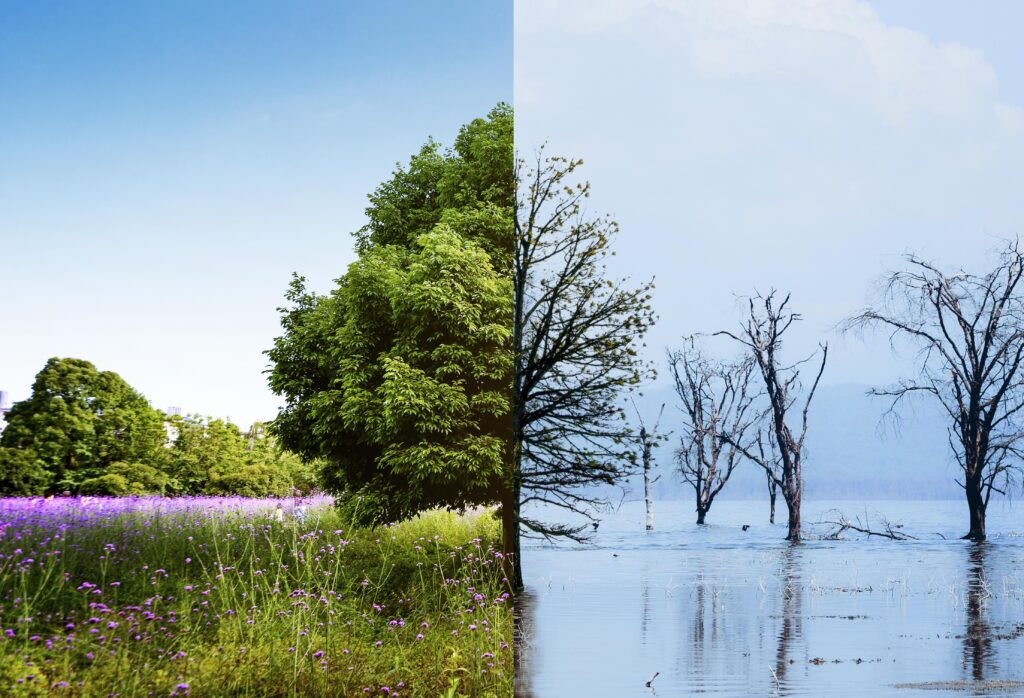
What is Climate Change?
Chances are, if you’ve come to VoteClimate, you’re concerned about climate change – also referred to as ‘climate breakdown’ or the ‘climate crisis’.
But what does net zero actually mean? And what is the UK’s net zero target?
If this explainer helps you answer the question ‘what is net zero?’, please share it using the social media buttons below, or copy and paste this link: URL

Tell Labour they can win votes by prioritising climate action – Pledge to put climate first at the next election. Make the pledge and we’ll tell you when and how to cast the strongest tactical vote for climate in national and local elections.
Net zero means that overall the amount of greenhouse gases emitted into the atmosphere is the same as the amount that’s taken out.
Greenhouse gases are gases which cause the greenhouse effect – trapping sunlight and causing the atmosphere to heat. The most well-known greenhouse gas is carbon dioxide (CO2). Others include methane and nitrous oxide. The greenhouse effect keeps the Earth warm enough for life. Greenhouse gases occur naturally, but they are also emitted when humans burn fossil fuels like oil and gas. Burning fossil fuels has caused greenhouse gas levels to get too high. This is causing the atmosphere to heat up dangerously fast, leading to climate change. We can see this in extreme weather like heatwaves, wildfires, droughts, floods and storms. Check out our explainer on climate change to learn more.
Net zero could be achieved by reducing greenhouse gas (GHG) emissions to zero. Or it could be achieved through measures to remove greenhouse gases from the atmosphere. Or it could be achieved through a mixture of the two.
In simple terms, under net zero, there is a perfect balance between GHG emissions entering the atmosphere and those removed.
As we explained above, the idea of net zero tends to assume greenhouse gases will continue to be emitted. This means the same amount of greenhouse gases need to be removed from the atmosphere.
There a few ways this can be done:
Direct capture and carbon capture and storage are new technologies. They can’t yet be used on a large scale – and it may never be possible to use them to absorb large amounts of carbon dioxide. Some critics of carbon capture say it is being promoted by the fossil fuel industry so they can carry on selling oil and gas, even though we don’t know if they work.
Offsetting through tree planting also comes with challenges. For example, many offsetting projects involve forcing local people in developing countries to leave their land so trees can be planted to absorb emissions produced mostly in the West.
There is another concept called absolute zero. This means that no greenhouse gases are emitted at all – meaning there are no emissions.
It is also known as gross zero or real zero.
In 2019, MPs in the UK’s House of Commons voted to make 2050 the deadline for the UK to reach net zero emissions. The UK government is required by law to achieve net zero by this date.
The UK’s net zero strategy is based on:
The government has also invested £21.7 billion over 25 years in five carbon capture and storage projects.
It’s too early to say whether the UK will achieve net zero by 2050. New policies and strategies will be needed get to net zero by 2050.
However, we do know that net zero is only part of the story. Scientists have calculated a carbon budget which is needed to keep temperature rises within safe limits – 1.5C of warming above pre-industrial levels. Based on the government’s current policies, the UK is due to exceed its share of the carbon budget in the early 2030s.
So the UK needs to go beyond its net zero target if we are to do our bit in keeping temperature rises to a safe level. You can learn more in our analysis of the Labour government’s manifesto.
There are lots of things you can do – from switching to a plant-based diet to giving up flying. There are many good reasons to take individual steps to reduce our emissions. However, what we do as individuals is a drop in the ocean. What we really need is government action.
At VoteClimate, we want to show the Labour government that it can win votes in future elections by adopting better climate policies. You can pledge to put climate first at the next election – if enough people make this pledge, we can show Labour that voters want climate action. And when you sign up, we’ll tell you when and how to cast the strongest tactical vote for climate in national and local elections.
See the latest news & updates from VoteClimate.

Chances are, if you’ve come to VoteClimate, you’re concerned about climate change – also referred to as ‘climate breakdown’ or the ‘climate crisis’.

The phrase ‘net zero’ gets bandied around a lot these days – you’ll often hear it on the lips of politicians left, right and centre.